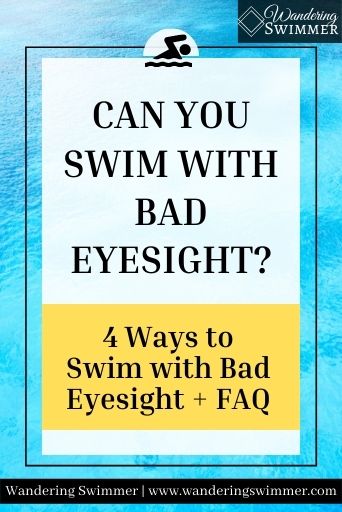Written By: Chevron
Bad eyesight may limit you from some things, but swimming isn’t one of them! I’ve swam with bad eyesight since I was little. Both for fun and through my swim career. So I know first hand that you can swim with poor vision and still enjoy swimming.
Related article: 7 Reasons to Wear Goggles When You Swim
Here’s how to swim when you have bad eyesight and some questions/tips to help you navigate the murky waters.
Disclaimer: We are not optometrists or physicians. These are only meant as a suggestion and starting point if you’re looking to start swimming if you have bad eyesight. Please consult a licensed professional if you’re seeking medical advice. Please see our disclaimer for more information.
Disclosure: This post may contain affiliate links, meaning we earn a small commission at no cost to you if you purchase something through one of our links. As an Amazon Associate, we earn from qualifying purchases. Please check out our disclosure page for more information.

How to Swim With Bad Eyesight
1. Prescription Goggles
My number one recommendation to swim with bad eyesight is to invest in a pair of prescription goggles. Prescription goggles are based off your prescription that you wear for your glasses or contacts. They’re basically glasses but in swim goggle format, allowing you to see perfectly while wearing them.
Prescription goggles are available from many different swim brands, such as Speedo, Sporti, and TYR. Personally, I used Speedo Vanquisher Optical Goggles throughout my high school and college years. And they served me well.
You can find my review of the top prescription goggles here: The 6 Best Prescription Goggles for Swimming + FAQ.
The only inconvenient issue with prescription goggles is that once you take them off, you can’t see as well. For me, this caused an issue with reading the clock whenever my goggles were off. But it was such a minor thing that it never deterred me from wearing them.
2. Regular Goggles
For some individuals, it’s just easier to swim with bad eyesight and not worry about wearing contacts or getting prescription goggles. And that’s okay! Before I learned about prescription goggles, I swam with regular goggles. And even now, when I have lighter training days, I’ll skip wearing my contacts and just squint to read the clock.
Related article: How to Fix Common Swim Goggle Problems
So long as you can still swim safely, wearing regular swim goggles is always an option. For your safety (and others), we do suggest that you only do this if you can still somewhat see what’s going on around you. You’ll want to make sure you’re not running into other people. And that you can see the walls and lifeguards.
Depending on the severity of your prescription though, it might be safer for you to look at prescription goggles.
3. Contacts with Goggles
We’ll start with a disclaimer that we’re not medical providers or Optometrists. Please consult your provider before swimming with contacts.
While wearing contacts when I train and compete is my current, preferred method to swimming with bad eye sight, most optometrists recommend against wearing contacts while swimming. My optometrist hates that I do and is forever warning me about the dangers. But many lap and competitive swimmers will swim with them in, so long as they’re wearing goggles.
Related article: How to Stop Your Goggles from Falling Off?
That said, if you wear contacts and want to swim laps, I highly encourage you to wear goggles in the water. Get you a good set that has a tight seal and won’t leak. Goggles will help decrease the risk of infection. You may also want to wear daily, disposable contacts.
4. Swim with Glasses
I don’t really recommend swimming with glasses. But I always get asked the question so I figured I would address it!
You can swim with glasses and hope they don’t fall off. But you run the major risk of losing your glasses in doing so and you’ll end up paying more to replace them compared to what you would’ve paid for prescription goggles. And as you’re swimming with your eyes open and exposing them to the chlorinated water, your eyes will be pretty dry after your workout.
More Content for You: Swimming Basics to Get You Started
Perhaps the only time I would see this working is if you were using a kickboard and had your head above water. Or perhaps you did a very slow backstroke. That said, if you do decide to wear glasses while you swim, I suggest using an elastic strap that attaches to the frame. This can help keep them more secure.

Swimming With Bad Eyesight FAQ
My Eyes Have Different Prescriptions. Can I Still Wear Prescription Goggles?
You absolutely can! My eyes have almost always had different prescriptions but I still wore prescription goggles. What most swimmers will do, myself included, is get two goggles; one in each prescription. After they’ve been delivered, I take the goggles apart and switch the goggle lenses around so I have the correct prescription.
This not only gives me the correct prescription, but it also gives me a second set of goggles that are ready to go. They work great as a back up pair of goggles and buy me time to get a new set if something ever happens to the first pair.
Are There Goggles that Go Over Glasses?
If there are, I haven’t seen any for swimming even though people will swear that you can put large goggles or a snorkel mask over glasses and be okay. This option doesn’t work because the glasses will break the goggle seal and water will get in.
Again, the more ideal option would be to opt for prescription goggles to save yourself any hassle. Body+ Nearsighted Snorkeling Gear in particular are prescription goggles specifically for snorkeling or open water use.

Will the Pool/Ocean Water Damage my Glasses?
Some good news is that chlorine in the pool or the salt in the ocean shouldn’t damage your glasses if they get splashed or dunked. In the short term, at least. You should give them a good cleaning after your swim to remove any chlorine or salt from them. Over time though, the constant salt and chemicals may damage your glasses, especially if you don’t clean them.
Does Swimming Improve Eyesight?
Swimming, unfortunately, doesn’t magically improve your eyesight. Otherwise, I’d probably be 20/20 by now! However, depending on how bad your eyesight is, your vision might be a bit clearer underwater than above. Not enough to pass an eye test, but things underwater might magnify enough that objects look sharper.

As always, happy swimming!
Chevron
Bonus Content
4 Ways to Prevent Swimmer’s Ear: Swimmer’s ear can be a painful experience if left untreated. That said, there are steps you can take to help prevent swimmer’s ear. Here are 4 ways to prevent swimmer’s ear.
Swimming on Your Period (And Why You Should): Yes, you can swim on your period! From one menstruating swimmer to another, here are some frequently asked questions I get about swimming on your period.

Want to Improve at the Pool?
Join swimmers and swim parents to receive my free newsletter and receive a free Swimming Glossary e-book as a thanks!
Every month you’ll receive tips and coaching to help you find success at the pool.
About

Chevron is a current competitive swimmer with almost 20 years of experience at the local, national and international level. A current USA Swimming and US Masters Swimming athlete, she’s committed to providing guidance to all levels of swimmers and believes that everyone should know how to swim.
